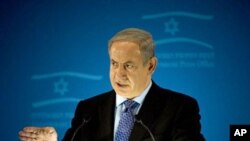With the ongoing war in Afghanistan and a diplomatic tussle with Iran over its nuclear program, the Middle East remains at the top of the U.S. foreign policy agenda. A new book claims America is making the wrong friends in the region - and calls for a radical rethinking of policy towards the Middle East.
In his new book Reset the Middle East, former New York Times foreign correspondent Stephen Kinzer argues for a bold realignment of the West’s links in the region.
In a speech at London analyst group Chatham House, Kinzer explained his reasoning.
“We are following policies that were made to address the Cold War in the Middle East," said Kinzer. "The strategic environment in the Middle East has changed tremendously since then, but our policies have not changed.”
Kinzer’s central premise is that the U.S. is making the wrong friends - and the wrong enemies in the Middle East. He said two criteria should determine who should be America’s allies: the characteristics of the society, and the country’s long-term strategic goals. With those in mind, he said Turkey stands out as a natural partner.
“Turkey has this vibrant capitalist economy," said Kinzer. "A thriving democracy - not without problems, but certainly in a relative sense, quite an attractive one. And in addition, Turkey’s long term strategic goals parallel ours.”
But it is Kinzer’s assessment of Iran that will cause the most surprise. Tehran and the West are currently locked in a diplomatic fight over Iran’s nuclear program. Kinzer said ignore the rhetoric - the Iranians should be America’s closest allies.
“Iran is the militant enemy of militant radical groups like the Taliban and al Qaida," said Kinzer. "Secondly, Iran has a huge ability to help stabilize Iraq. Iran also has tremendous ability to project influence in Afghanistan, which is the huge strategic challenge certainly facing the United States and I’d argue also the whole West.”
Rosemary Hollis, an expert on the Middle East at City University London, was among the audience listening to Kinzer’s speech. She said he failed to address the central source of tension in the Middle East - the Israeli-Palestinian conflict.
“He thought the most productive line for the United States to take would be to completely restructure the relationship with Iran and hope that that would change other things in the region," said Hollis. "He has some big ideas, they are useful to get people thinking, but it’s not a blueprint for how to proceed.”
With the Israeli-Palestinian peace process seemingly deadlocked, Kinzer’s book will certainly provoke debate over how the West should engage with the Middle East - and what the future might hold for the region.




